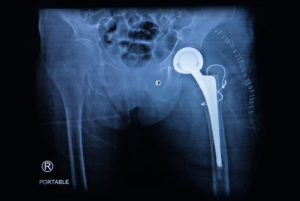
An Oregon metal hip replacement lawsuit may be an option for people who have experienced complications after having a metal-on-metal hip replacement. Metal hip replacement surgery may be the only available option for some patients who experience hip joint pain and wish to increase their mobility and improve their overall quality of life. However, there are a number of risks involved, including the need for debilitating revision surgery. Affected patients and their families may be able to file an Oregon metal hip replacement lawsuit and recover damages as a result of their injuries.
If you or someone you love has had a metal-on-metal hip implant and experienced complications, contact the Attorney Group for Oregon. We can help answer your questions and explain your options to you. If you choose to pursue a case, we can connect you with an affiliated Oregon metal hip replacement lawsuit attorney who can help you throughout the legal process.
Hip Replacement Surgery
Damage caused by osteoarthritis (wearing down of the flexible tissue at the end of bones), injury, fracture, bone tumors, and other forms of arthritis may result in the breakdown of the hip joint. When pain caused by hip joint damage interferes with daily life, people may decide to undergo hip replacement surgery when other forms of treatment are not available or fail to work effectively.
Traditionally, hip replacement surgery was reserved for older patients, usually over the age of 60. As medical technology has advanced, some doctors have discovered that hip replacement surgery may be beneficial to younger patients as well. People may opt to have surgery based on a number of factors and for a number of reasons. Patients who choose to have hip replacement surgery are primarily looking to improve their life in some way. Improvements may include:
- An increase in mobility
- A decrease in joint pain
- An improvement in activities and daily living
- An overall improvement in the quality of life
There are alternatives to hip replacement surgery. Some doctors may suggest exercise, walking aids and medication. When these forms of treatments are not enough to relieve pain and improve joint function, less complex surgeries designed to correct the problem may be an option before a patient receives a total hip replacement.
Metal Hip Replacement Risks
Hip replacement surgery may not be advisable in some patients, particularly those with chronic disorders such as Parkinson’s disease, severe muscle weakness, or people who are high risk for infections. The most common complications associated with metal hip replacement devices include dislocation of the implant and device wear and tear.
Dislocation occurs when the ball of the hip comes out of the socket. As tissues heal within the first few months after surgery, the risk of dislocation is increased. When metal hip replacements become dislocated multiple time, revision surgery may be necessary to correct the problem.
FDA Warnings and Updates
According to the U.S. Food and Drug Administration (FDA), all artificial hip implants (including metal-on-metal) pose certain risks. In addition to the general risks associated with hip replacement devices, metal-on-metal implants pose particular risks, including:
- Release of metal particles into the tissues surrounding the implant
- Wear and corrosion at the point where the metal ball and the stem meet
- Entry of metal ions, such as cobalt and chromium, into the bloodstream
Additionally, the areas surrounding the hip implant may become damaged due to the release of metal particles over a period of time. When this occurs, it is sometimes known as “adverse local tissue reaction (ALTR),” “adverse reaction to metal debris (ARMD),” or metallosis. Damage to the soft tissues around the implant can lead to pain, discomfort, implant loosening, device failure, and the need for revision surgery.
Metallosis caused by metal hip implants may result in other complications and side effects, including confusion, gastrointestinal problems, emotional disturbance, chronic infections, dizziness, headaches, and problems related to the nervous system.
How an Oregon Metal Hip Replacement Lawsuit Can Help

Device makers have a duty to provide safe products. If there are risks of harm associated with their products, they also must provide adequate warnings. If a device maker fails to fulfill this duty, it could be held liable in lawsuits for injuries that may result.
People injured by the fault of others may be eligible to recover money for:
- Medical Expenses
- Lost Wages
- Pain and Suffering
The families of those who have died may be eligible to recover money for funeral expenses and the pain that comes with losing a loved one.
The Time You Have to Pursue a Claim is Limited. Contact Us Today.
For more information, contact the Attorney Group for Oregon. You can fill out the form on this page or contact us by phone or email.
After you contact us, an attorney will follow up to answer questions that you might have. There is no cost or obligation to speak with us, and any information you provide will be kept confidential.
Please note that the law limits the time you have to pursue a claim or file a lawsuit for an injury. If you think you have a case, you should not delay taking action.





